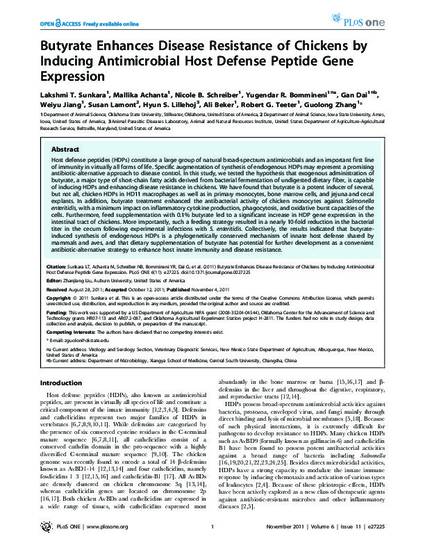
Host defense peptides (HDPs) constitute a large group of natural broad-spectrum antimicrobials and an important first line of immunity in virtually all forms of life. Specific augmentation of synthesis of endogenous HDPs may represent a promising antibiotic-alternative approach to disease control. In this study, we tested the hypothesis that exogenous administration of butyrate, a major type of short-chain fatty acids derived from bacterial fermentation of undigested dietary fiber, is capable of inducing HDPs and enhancing disease resistance in chickens. We have found that butyrate is a potent inducer of several, but not all, chicken HDPs in HD11 macrophages as well as in primary monocytes, bone marrow cells, and jejuna and cecal explants. In addition, butyrate treatment enhanced the antibacterial activity of chicken monocytes against Salmonella enteritidis, with a minimum impact on inflammatory cytokine production, phagocytosis, and oxidative burst capacities of the cells. Furthermore, feed supplementation with 0.1% butyrate led to a significant increase in HDP gene expression in the intestinal tract of chickens. More importantly, such a feeding strategy resulted in a nearly 10-fold reduction in the bacterial titer in the cecum following experimental infections with S. enteritidis. Collectively, the results indicated that butyrate-induced synthesis of endogenous HDPs is a phylogenetically conserved mechanism of innate host defense shared by mammals and aves, and that dietary supplementation of butyrate has potential for further development as a convenient antibiotic-alternative strategy to enhance host innate immunity and disease resistance.
Available at: http://works.bepress.com/susan_lamont/60/

This article is from PLoS One 6 (2011): e27225, doi:10.1371/journal.pone.0027225.